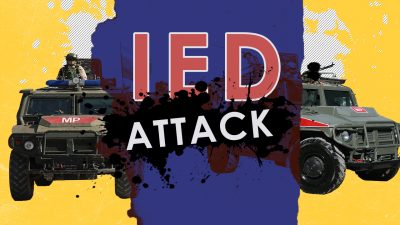Video: Explosion Targets Russian Military Police Patrol in Northern Syria. Who Was Behind It?

On June 9, an improvised explosive device exploded on the route of the patrol of the Russian Military Police near the town of Ayn al-Arab (also known as Kobani) in northern Syria. Initially, Kurdish sources claimed that at least 3 Russian service members were injured in the attack. The Russian reconciliation center denied these claims saying that nobody had been injured in the explosion. Photos from the site of the incident show that the TIGR infantry mobility vehicle was significantly damaged. Attack helicopters were deployed to cover the return of Russian troops to their permanent deployment location.
No group has claimed responsibility for the IED attack. However, pro-Turkish sources as always blamed US-backed Kurdish armed groups for the provocation. Just recently, the number of incidents in northeastern Syria between US and Russian patrols increased. Both the forces of the US-led coalition and the Russian Military Police work to limit each other’s freedom of movement. On top of this, the US military openly admits that it is working to prevent the Russians from strengthening their positions in this part of Syria.
Later on June 9, the Russian Military Police and the Turkish Army conducted a joint patrol near the border town of Derbasiya. The patrol took place without incident. At the same time, the Syrian Army reinforced its positions at the Tabqa Military Airport. Over the past weeks, government forces have significantly increased their military presence in this part of Raqqa province.
On June 10, artillery units of the Syrian Army struck fortified positions of Hayat Tahrir al-Sham and its allies near the villages of al-Fatirah, Fulayfil and Dahr al-Kabir in southern Idlib. Following the recent clashes near Tunjarah, militants have increased their activity along the contact line. Pro-government sources claim that al-Qaeda-linked groups are preparing a major attack on Syrian Army positions.
Turkish President Recep Tayyip Erdogan also reacted to the current tensions by claiming that the Damascus government was increasing provocations and Turkey would not allow Idlib to become a conflict zone again. It is interesting to note how the Turkish President manages to describe regular violations of the ceasefire regime by Turkish-protected al-Qaeda groups in such terms.
Turkey’s silent agreement with terrorists allowed its forces to set up a network of observation posts along the M4 highway in southern Idlib and even to secure the joint Turkish-Russian patrols along a part of the highway.Nonetheless, the continued tolerance of the presence of the terrorist groups in Greater Idlib creates strong preconditions for the destabilization of the region.
*
Note to readers: please click the share buttons above or below. Forward this article to your email lists. Crosspost on your blog site, internet forums. etc.
Support South Front in its endeavors. If you’re able, and if you like our content and approach, please support the project. Our work wouldn’t be possible without your help: PayPal: [email protected] or via: http://southfront.org/donate/ or via: https://www.patreon.com/southfront

